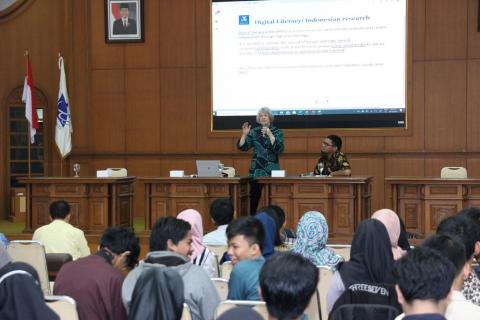You are here
DR. ELIZABETH HARTNELL-YOUNG INVITES CRITICAL THINKING STUDENTS TO FACE HOAX
Primary tabs

New literacy involves digital literacy, information literacy, multiliterate, and 21st-century skills that demand capture, produce and create skills that involve digital processes, information media and literacy skills. The assessment is data-based. Dr Elizabeth Hartnell-Young stated it; she is from The University of Melbourne, Australia as a guest speaker at the Department of Electronics and Informatics Engineering Education (10/29/2019). She declared that the understanding of new literacy could not be separated from the old literacy, which in essence cannot be separated from the three pillars of literacy, namely reading, writing and archiving. If related to literacy, there must be an explicit formula, and all of this is a part of the role of educational institutions, especially higher education.
Dr Elizabeth stated that new literacy is marked by the rise of various social media, website pages, blogs, games, and animation. "Indonesia is one of the biggest users of social media in the world," she said.
"Even in the Asia Pacific, Indonesia ranks third-largest smartphone user, making the number of smartphones exceed the population in Indonesia," she continued.
"Also, Indonesia is the 4th largest user of Facebook in the world, and tens of millions of Instagram users also come from Indonesia," she added.
It certainly can be potential if it is well managed and utilized. However, it can also have a negative impact if a high literacy spirit does not accompany it," she explained.
One of the harmful effects is that hoaxes or fake news are easily spread in the community, and this can cause unrest. Therefore the ability to think Christian is needed to analyze information objectively so that it can provide an appropriate assessment.
"Besides critical thinking, other skills needed in the 21st century include communication skills, problem-solving, collaboration, ICT skills, and creativity," concluded Dr Elizabeth.
Contact Us
Address : Kompleks Fakultas Teknik Kampus Karangmalang, Yogyakarta, 55281
Telephone : +62 274554686
Email : pte_ft@uny.ac.id
Copyright © 2024,
